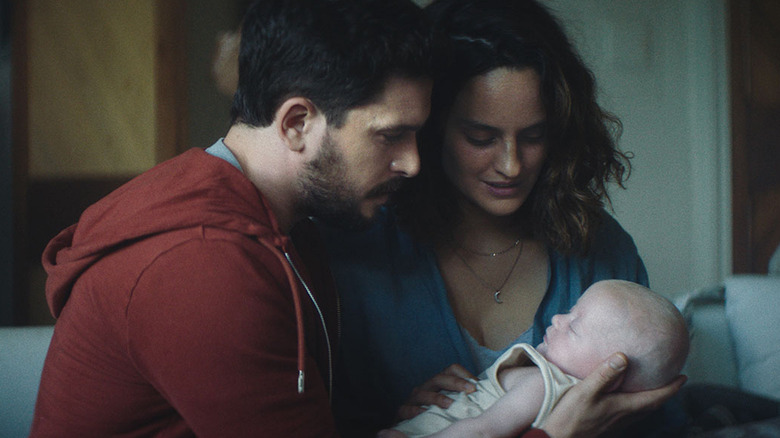Baby Ruby Review: Motherhood Is Hell [TIFF]
Pop culture — at least in the Western world — treats pregnancy and early motherhood as a magical time, when back aches and sleepless nights are a mere inconvenience in what is otherwise a fantastic, love-fuelled, once-in-a-lifetime journey. That is bulls***. And with "Baby Ruby," Bess Wohl is setting the record straight.
Premiering at the 2022 Toronto International Film Festival, "Baby Ruby" is a tense, visceral psychological thriller that sets out to dismantle everything you think you know about being a mom. Written and directed by Tony-nominated American playwright Bess Wohl, the film centers on the independent, perfectionist, mom-to-be Jo (Noémie Merlant), who branded herself as a chic lifestyle influencer through her successful blog, "Love, Joséphine." Using the power of the internet — and, let's face it, her good looks and wealth — Jo has carefully curated an aspirational image for her online followers. She takes it all on herself; taking control of every aspect of her life; she even goes as far as to plan her own baby shower, which she then turns into content for the website. It's too much. There's no separation between her life and her work, and it's a disastrous situation to be in as a new mother. Jo believes she can "do it all." Every experienced mother in the audience knows she can't.
In a tight 93 minutes, Wohl both sets up and thoroughly dissembles Jo's ego, confidence, and seemingly perfect image on screen. We get a female perspective on the psychological and emotional trauma of early motherhood: the loss of one's sense of self, the strain on one's mental house, the physical pain, and humiliation. It's an uncomfortable, yet stylish, depiction of a mental breakdown — think Darren Aronofsky's "Black Swan" but with a woman on both sides of the lens.
'It's hell'
To say that "Baby Ruby" is intense would be an understatement. Wohl creates such a feeling of unease that the film verges on intolerable. I was at the edge of my seat for most of the run-time — in part because the cinematography was so unnerving, but also because I couldn't help but be worried about poor baby Ruby and her deteriorating mother, Jo. Postpartum depression is getting more recognition now, but it's still a largely misunderstood condition — one that often brings with it feelings of deep shame. Society tells us that "good" mothers love their children and tackle the strains and stress of infant care with ease. But that's just not what the first few months are like for the vast majority of new parents.
As mother-in-law Doris (Jayne Atkinson) confides in Jo: "It's hell."
I did not experience postpartum depression, and to be honest, both my kids were relatively easy babies. Still, I can relate to Jo's experience in "Baby Ruby." For years, I would hear an infant crying at night — even when my youngest was well into his toddler years. I remember the pain of bathroom trips post-birth, and the embarrassment of walking around in what felt like a pillow wrapped around my crotch. I breastfed, and there were times when my nipples were so chapped they bled. Nursing when you're tired, and you're sore — it feels like life is being sucked out of you. I was a different person walking into the hospital pregnant than I was when I left with my child, and I've never felt that experience has been represented honestly in media — until "Baby Ruby."
Is it worth it?
A phrase I heard a lot during my kids' infancies was "it takes a village." Although it's never spoken in "Baby Ruby," that message is the core thesis this film argues for. Increasingly in our social-media-obsessed culture, we've become isolated. We craft images of ourselves online that are too good to be true, and we feel insecure about the impossibly perfect people we follow. It's a vicious cycle that serves to reinforce insecurities and isolation. Jo doesn't know how to ask for help, or even recognize that she needs it. As a result, she keeps "failing" to meet her own impossible, self-imposed standards — and she doesn't have the tools to deal with that.
Ever since my screening, I've been wrestling with the actual experience of watching "Baby Ruby." It was not enjoyable; that isn't to say that it isn't compelling, or that I didn't get anything from it. Quite the contrary — it's been on my mind since I walked out of that studio. The film has a lot to say, and much of it is poignant and, dare I say, necessary.
There's the question, "was it worth it?" For me, being a parent was worth the sacrifice, and I think ultimately that's the message of "Baby Ruby." In terms of watching the film ... I honestly can't say. I do believe it is a well-crafted film, and I have a deep respect for what Wohl accomplishes. Kit Harington is endlessly charming as Jo's husband Spencer, and Atkinson nails the quintessential well-meaning but also infuriating mother-in-law. The film's pacing is relentless though, and for me, some of the clearly symbolic imagery got in the way of telling a cohesive story. Maybe the biggest issue, for me, is that the content hit too close to home.
I'll have to watch again to find out.
/Film Rating: 7.5 out of 10


